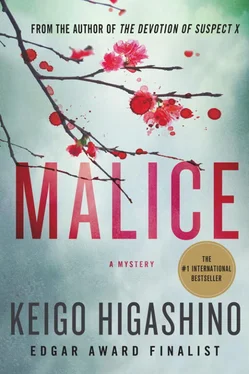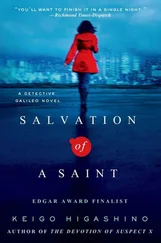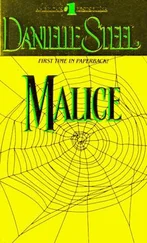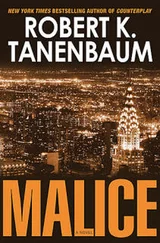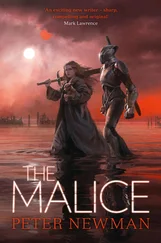“Then you waited until April sixteenth, the day you murdered Kunihiko Hidaka.
“Clearly this wasn’t a momentary loss of control or an act carried out ‘in the heat of the moment.’ It was a terrifyingly premeditated execution, the result of a great deal of planning. While you put an impressive amount of thought and energy into it, this alone doesn’t distinguish your crime from all the other murders. I have to admit, the twist you put on it was genius. Typically, much of the planning that goes into a premeditated murder involves schemes to establish an alibi, avoid arrest, or, at the very least, avoid blame.
“But your plan was unique. You had an entirely different goal in mind. You wanted to get arrested. You didn’t care about committing the perfect crime. You wanted to establish the perfect motive.
“I know. It’s a rather startling idea. You may be the first murderer that decided to fabricate a motive before committing the crime. Believe me, I almost couldn’t bring myself to accept the truth. During the long hours it took me to reach the point where I was confident I’d uncovered the truth, I doubted myself every step of the way. In fact, I refused to believe what the facts were telling me.
“Of course, had we questioned any of the evidence earlier—say, the videotape—then we might well have resolved this much more quickly. Yet who would suspect a killer of forging a vital piece of evidence indicating his own guilt of a crime? Truly, that was a brilliant stroke.
“The same goes for the fake manuscripts you prepared and the clues you planted suggesting that you had had a relationship with Hatsumi Hidaka. If any of those had been evidence that exonerated you, we would have certainly put them under a microscope. Yet we did nothing of the sort because every bit of it seemed to only confirm your motive. It is an unfortunate fact that the police tend to turn a stern eye toward evidence that benefits a suspect, but tend to be rather easygoing when it comes to evidence that implicates our suspect. A tendency you deftly took advantage of.
“You led our investigation down the exact wrong path with a series of carefully laid traps. The first was the notebooks you prepared. The second was the apron, the necklace, the travel documents, and the photograph of Hatsumi Hidaka. Thinking back on it, I suspect you were getting nervous when it took us so long to find that photograph. That’s probably why you felt the need to drop that hint about the ‘important books.’ How relieved you must have been when I took the bait.
“I required a little guidance to fall into the third trap as well. If you hadn’t gone out of your way to ask Rie about the tapes Hidaka sent to Canada, I might never have keyed in to their importance. You must have been so pleased with your idea to hide the tape inside a copy of Sea Ghost —the novel that inspired your false motive in the first place. You even made sure I was aware of that particular novel by recommending it to me the first night we met. That was all part of your plan, too, wasn’t it? I have to say, I’m impressed.
“Now let’s turn back the hands of the clock just a touch further to the day you killed Kunihiko Hidaka.
“The murder was planned quite thoroughly, yet you couldn’t have anyone catching on to that fact. It had to seem like a rash act done out of desperation, in the ‘heat of the moment.’ Anything else would undermine your false motive. A knife or poison wouldn’t work, those would be too obviously premeditated. What about strangulation? Considering your relative physical strengths, that might be difficult for you to accomplish.
“No, your best bet was blunt trauma: striking him with a dull instrument from behind. Once he’d fallen to the floor you could easily strangle him. But you’d still need a suitable murder weapon—one that you could have found at the scene. Hidaka’s paperweight would do the trick nicely. How to strangle him? A telephone cord! I can just picture you checking off each item on your mental checklist.
“Here, however, was a potential problem. The movers having already packed up most of the house, what if the paperweight was no longer there? Unlike the phone cord, the paperweight wasn’t an absolute necessity. It could already be packed in some cardboard box.
“So you prepared a backup: the Dom Pérignon. The bottle was intended as your backup murder weapon, which is why you didn’t offer the gift upon your arrival. If you did, they might store it somewhere out of easy reach. No, first you had to check the office. Relieved to see that the paperweight was still there, you were then free to give them the champagne bottle as a gift to celebrate their big move.
“When I first heard about the champagne, I wondered if it had been poisoned. I even asked the manager of the hotel who ended up with it how it tasted. He said it was quite good. Of course, now I know that you never would’ve used poison in the first place.
“The trick you used to establish your alibi—using the fax software on the computer—was brilliant. Smart enough to fool an older detective—I’m pretty sure the chief still hasn’t figured it out, by the way—and yet flawed enough, with the monitor left on and the wrong redial number on the house phone, that someone was sure to see through it.
“I wonder what you would have done if we hadn’t figured it out, though. What if you were never even a suspect? I see you’re hesitant to respond. Well, don’t worry about it. We did see through your trick, as intended, and you were arrested.
“You look tired. I’m sorry to have talked for so long. But bear with me just a little longer. After all, you put me through quite a lot to reach this point. It seems only fair that you suffer a little yourself.
“Let’s get down to the big question here: Why go through all that trouble to construct a false motive with the express intent of being arrested? It flies in the face of common sense.
“Of course you had a motive, a different motive, for killing Kunihiko Hidaka. And you were more frightened that your true motive would be revealed than you were of being found guilty for the murder of Kunihiko Hidaka.
“As for what that motive was, I know what it is, but I’d really like to hear it from you. Well? Why not tell me? I can’t see that there’s any point in you remaining silent.
“No? Very well. As you seem to have no intention of talking, let me tell you instead.
“Do know what this is, Mr. Nonoguchi? That’s right, a CD. Not for music. It’s a CD-ROM, one Hidaka had burned for himself. It turns out that several years ago, he started keeping all his research materials—photos included—on CD. He scanned his older photos and starting using a digital camera to take the newer ones.
“Why did I think to look through all of Hidaka’s reference photos? It was because, in the course of sorting through the past—his past, and your past—a particular photograph came to my attention. If that photograph showed what I thought it might, then something I hadn’t been paying much attention to would suddenly become extremely important, and several unrelated facts would line up quite nicely.
“It turns out that the original photograph had already been thrown away. But I knew that Mr. Hidaka had had it in his possession and had plenty of time to make a copy. Thus, this CD. Sorry, I know I’m being overly dramatic, building up to this; but there really isn’t any need, is there? You already know what photo I mean. It’s an old Polaroid of Masaya Fujio assaulting a middle-school girl.
“The photograph’s quite clear. I was going to print it out and bring it with me but there really wasn’t any point. You know what I saw in that photograph. It was exactly what I’d anticipated. You were the one holding her down, Mr. Nonoguchi. You helped Masaya Fujio rape that girl.
Читать дальше
